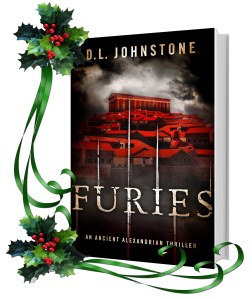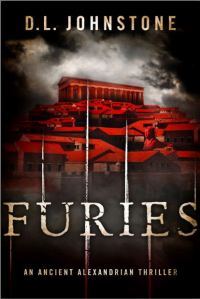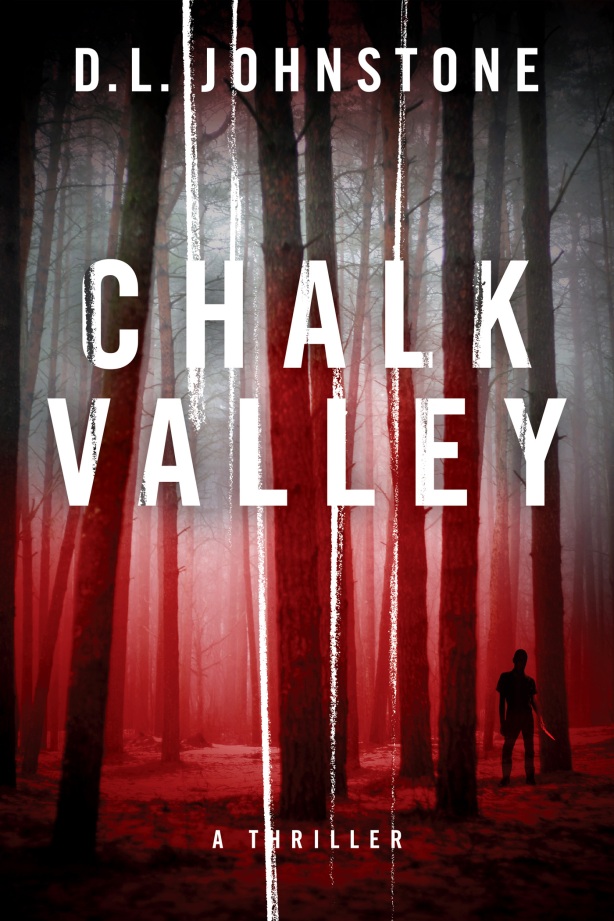This post first appeared as a guest post in “Laurie’s Thoughts & Reviews” on 12/15/12
http://lauries-interviews.blogspot.ca/2012/12/furies-by-d-l-johnstone-guest-post.html
Okay, I admit I’m not the brightest bulb on the Christmas tree. You see, when I decided to write an historical thriller, I thought it would somehow be easier than writing another contemporary thriller like my first book, CHALK VALLEY. To this day, I have no idea why I thought that. But the problem is, in addition to being none-too-bright, I’m like a dog on a bone once I get an idea that intrigues me. I studied philosophy in university and I’m fascinated by ancient Greek and Roman history. The idea of writing a crime thriller involving some classic philosophers in an era when induction and logic was a new concept just grabbed onto me and wouldn’t let go. What the heck, I thought, how tough could it be? As things would turn out, really, really tough. Really.
Before I get too far into this, let me offer a quick synopsis on FURIES: It’s set in 36 AD in Alexandria, Egypt, the most beautiful, exotic city of the Roman Empire. It tells the story of wealthy Roman merchant Decimus Tarquitius Aculeo for whom Alexandria has become a living hell. He’s been ruined by a string of investment disasters, abandoned by friends and family, and he’s desperate to recover his wealth and status. But his search for the reasons behind his downfall draws him into investigating the murders of two women linked to some very powerful people. It’s a dangerous, treacherous game, but he has no choice but to play if he’s to regain all that he lost.
Why Alexandria? Because it has an incredible history, but relatively little has been written about it. Alexandria was first established in 334 BC by Alexander the Great. This was the city of the Ptolemies, Cleopatra, Julius Caesar and Marcus Antonius. It was also the centre of culture, with a Library said to house all written works known to man (no easy task two millenia prior to the internet). The Museion where the greatest philosophers of the day studied .The famed Pharos (lighthouse), an ancient wonder of the world. An the Agora (marketplace) where it was said you could find anything your heart or body desired – for the right price. In 36 AD when FURIES takes place, Alexandria is under Roman rule and is still a fascinating city with phenomenal wealth and a population density that rivals modern Manhattan. As the centre of commerce for the Empire, with trade ships coming from as far away as Gaul and China, and a population comprised of Greeks, Romans, native Egyptians and Jews and everything in between, it was by far the most multi-cultural city of the age.
Interesting, but to write a thriller set in this city, you need to know what it looked like. What did it feel like walking down its streets? What sites could you see? Egypt’s history goes back over 5,000 years. Heck, you can still visit the Pyramids and the Sphinx of the original dynasties. As for the physical city of ancient Alexandria though, we know relatively little. The city itself is still there, but the Alexandria of old lies buried under centuries of earthquakes, gathered silt from the mouth of the Nile. The modern city and the Egyptian Sea completely covers it. The only thing still standing from the ancient city is the mis-named Pompey’s Pillar and a few entrances to the underground cisterns. That’s it. The Library is gone, the books sadly lost or destroyed over a thousand years ago. The last sections of the Lighthouse fell down 600 years ago. There’s a great deal of work being done these days by archaeologists under the water – they’re finding some stunning sculpture heads, blocks that they think are from the ancient harbour and possibly some sections of the Lighthouse. Can you imagine trying to recreate London or Paris 2,000 years from now with only a few historians’ scattered comments. It’s crazy! But I never said it was a good idea. Only that I was committed. Or should be.
Finally, most importantly, what were the people like? We know certain historical figures, yes. The kings and queens of old, the prefects, the scholars. But what about people on the street? The main character, Aculeo, isn’t a historical figure, nor a politician, nor a scholar. He’s a wealthy merchant, or at least he was. Merchants, bankers, healers, slaves … who were they? What did they eat, wear, talk about, joke about, drink ? (A lot of palm beer and surprisingly good wine, as it turns out). What songs did they sing? What jokes did they tell? What curses did they use ? (Some really nasty ones that I won’t repeat here!).
Of course, we know some things about what ancient Alexandria looked like. The streets, for example, were laid out in a perfect gridwork, the first planned city, designed according to the vision of Alexander the Great himself. It wasn’t like most ancient cities (and a few modern ones), built on random cart paths and having little sense overall. We know there were five districts, including the palace district said to make up 20% of the city. We know the houses were all bone white and red-roofed. We know their basic structure. We know the streets were paved and wide and lit by torch at night, at least in the good part of town. We know many of the houses were made of mud-brick. We know there were sphinxes and other even more ancient icons stolen from Egyptian temples scattered about the city to beautify it even more. We know many little details like that, but a comprehensive view of the city in that era just doesn’t exist. It had to be patched together like a quilt. I could have made things up, I suppose, and yes, here and there I did, but I strove to stick to the pig-headed ideal of historic accuracy where and when I could.
Some of my best research about the people came not from the usual history books, but from a very different source. From mummies, or mummy wrappings and the work of papyrologists, to be more specific. The Egyptian tradition of embalming the dead often used recycled papyrus. Unwrapped mummies might reveal property deeds, personal letters, or official government letters, unveiling some fine, fascinating points of everyday life. Some were incredibly well preserved, some not so much, but all of them were beautifully revealing.
For example, three of the characters in FURIES were based in part on real people who lived in Alexandria, mentioned in some of these documents. An ex-soldier named Apollonios was a religious fanatic who lived on handouts in the Temple of Sarapis. He took care of a pair of orphaned little girls who’d been left on the steps of the temple for the priests to raise. The letters described these ordinary people in fascinating detail – things not typically talked about by scholars of the day. They provided interesting, realistic details that helped give FURIES accuracy, but even moreso, give it spirit.
I believe solid historical fiction hinges on solid accuracy. Writers owe this to their readers, as long as it doesn’t get in the way of telling a good story. I hope I’ve done ancient Alexandria justice with FURIES. Yes, it was a long journey, and yes, it was a big mistake.
But some of my best decisions started as big mistakes.






